A few weeks ago, an article appeared in the New York Times that shook the romance community up a little. Robert Gottlieb gave a somewhat mocking summary of a handful of current romance out now in “A Roundup of the Season’s Romance Novels.” There was also a response entitled “Who Gets to Write About Romance? A Response from the Book Desk,” which dealt with some of the reader emails the original article inspired.
I have to admit that I am often sensitive to talk of romance, because often it is very disparaging. My boss recently found out I write romance and young adult, and he started chattering about it during my last one-on-one, telling me with a laugh that his wife reads romance novels. After informing me that he’s never read one himself, he said, “She tells me they’re historical novels,” laughed and continued, “I say, no, no they’re not.”
This pissed me off. What, he’s a literary expert because he’s never read one? Where does he get his information? Oh, that’s right—our lovely society. The same one that diminishes everything that women* do. Always. I rather ineloquently defended the genre to him. He got a little flustered and repeatedly said, “I didn’t mean to upset you,” while I continued rambling on. It wasn’t my finest moment, but I did avoid saying what was in my head at the time: “Then don’t say stupid sexist shit.” And also, as a matter of course, “Don’t insult something your employee spends almost as much of their free time doing as they spend at work.” Know what this guy’s hobby is? He rides a motorcycle. You don’t see me going around pointing out that I also liked to play on bikes—when I was nine.
Argh.
So I’m going to look at Gottlieb’s article. First off, I have to say that I find it difficult to imagine him wrapping himself in a plaid throw while curling up on a wingback chair in front of a crackling fire to devour the ten or so novels he references from start to finish. However, it’s clear that he at least skimmed all of them because he was able to identify the sex scenes. And despite the accusation of formula, it’s not true that these scenes always appear at designated points in all novels. It can be hard to find them if you don’t know (or remember) the story well. So I’m a little more willing to listen to what he has to say.**
What he says, basically, is that romance novels coming out now are ridiculous, partially because they include detailed and explicit sex scenes. But he also mocks the plots for being unbelievable, trite, and predictable. He says:
Whichever of these heroines you may be, you are guaranteed to end up in marital (often ducal) heaven, after dealing with one or another of the ingenious obstacles that create whatever suspense the genre can generate.
That does sort of sum things up, I’ll admit. But the implication is that it’s a bad thing. That a “lack of suspense” is a problem. I would argue that there is suspense, even if it’s not for the overarching plot. We do know they’ll get together. But the suspense comes from wondering how they’ll make it work. What solutions will be found and compromises made to resolve the competing differences they have? It’s not always clear what those will be. Furthermore, romance readers are voracious, book-devouring monsters, right? They read fast and often consume multiple books a week. So is it any surprise that there is a bit of repetition and difficulty coming up with something totally new and different without slipping into the slightly absurd every once in a while? And does it matter? Books are supposed to be entertaining, and if romance readers are entertained, who cares?
Some readers like to be deeply challenged. They liked to be made to learn something shiny and new, or think about something from a novel perspective, or at least be fundamentally surprised. And that’s fine. There is a lot of literature out there that does that. I used to read predominately literary novels because I always wanted deep characterization and I liked it when (emotionally) horrible things happen to characters. I also liked it when there was at least a chance that things would end badly. And I really hoped it would make me cry at some point.
However, now, I almost exclusively read romance and young adult (almost always contemporary in both). I write in these two genres and feel obligated to do my best to stay up-to-date and of course I have limited time to allocate to reading. I struggle with reading historical romance novels because I generally find them either sexist or anachronistic. My first BA degree was in history, so blatant inaccuracy bugs me. But it does not make me happy to read period-appropriate treatment of women, either.
Basically—and this is important—the whole point of novels is to take the reader on an emotional journey. Anyone who’s every gotten swept away by a book knows that everything in it is relative. You do suspend disbelief. So all those sex scenes that Gottlieb mocked? A lot of things are ridiculous out of context. I can see how the excerpts printed in the article are a little laughable when read cold. But if you take any emotionally charged moment (fiction or real life) and just dump it in someone’s face with absolutely no context, of course it will seem ridiculous. It’s totally unnatural. But love scenes in romance aren’t like that. No—there’s build-up to get the reader entrenched in the increasing emotional intensity of the moment, so that it flows and the reader goes along with the emotion.
Basically, my point is that not all art needs to challenge people to their core. There is nothing at all wrong with art that purely entertains. And whatever you think of it, romance novels do that.
* Actually, this should read “people who aren’t white cis-gendered dudes,” but I’m only talking about what I have more direct experience with.
** It is true that someone else could have done the skimming/reading and just given him the snippets to talk about. But I’m giving him the benefit of the doubt.
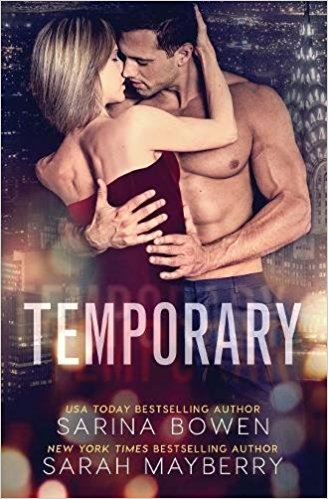 Another enjoyable read from Bowen. Mayberry is new to me, but their styles meshed together seamlessly.
Another enjoyable read from Bowen. Mayberry is new to me, but their styles meshed together seamlessly.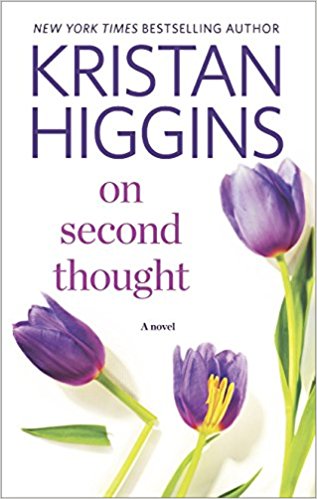 On Second Thought is the first of Higgins’ non-romance* books that I’ve read. And I’m happy to report I loved it. There is romance in the book—two, in fact—but the main storyline is two grown sisters getting close to each other for the first time.
On Second Thought is the first of Higgins’ non-romance* books that I’ve read. And I’m happy to report I loved it. There is romance in the book—two, in fact—but the main storyline is two grown sisters getting close to each other for the first time.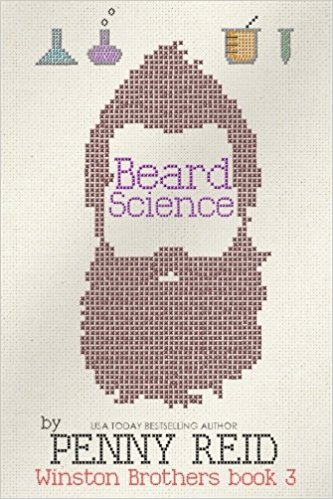 Jennifer Sylvester is kind of a joke in Green Valley, Tennessee, where she’s know as the Banana Cake Queen because—well, you can guess why. The recipe is a family secret. People don’t take her seriously. One of the locals called her “stranger than a vegetarian at a barbecue.” And on top of that, her parents are bullies, especially her mom. She’s forbidden to wear anything but her Sunday best clothes out in public. Now, she’s definitely old enough to be living on her own, but with the way her family treats her (borderline abuse), it’s really difficult for her to move out. They have her working full-time in the family bakery, but they don’t give her a salary. What she wants more than anything is to start a family, but with her so isolated, she never really meets men in any useful way.
Jennifer Sylvester is kind of a joke in Green Valley, Tennessee, where she’s know as the Banana Cake Queen because—well, you can guess why. The recipe is a family secret. People don’t take her seriously. One of the locals called her “stranger than a vegetarian at a barbecue.” And on top of that, her parents are bullies, especially her mom. She’s forbidden to wear anything but her Sunday best clothes out in public. Now, she’s definitely old enough to be living on her own, but with the way her family treats her (borderline abuse), it’s really difficult for her to move out. They have her working full-time in the family bakery, but they don’t give her a salary. What she wants more than anything is to start a family, but with her so isolated, she never really meets men in any useful way. Read on if you’r interested in more hockey hotness from Bowen and Kennedy. Stay is the second in the WAGs series (that’s wives and girlfriends for those of you not in the know) after Good Boy. And it features a cool girl and another hot hockey player.
Read on if you’r interested in more hockey hotness from Bowen and Kennedy. Stay is the second in the WAGs series (that’s wives and girlfriends for those of you not in the know) after Good Boy. And it features a cool girl and another hot hockey player.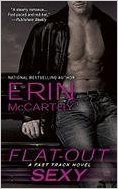 If you’d told me I’d enjoy a romance about a hot professional race car driver, I wouldn’t have believed you. But Flat-out Sexy is a solid, complex story about a race widow and a young driver. Kudos to McCarthy to making the world of NASCAR interesting to me.
If you’d told me I’d enjoy a romance about a hot professional race car driver, I wouldn’t have believed you. But Flat-out Sexy is a solid, complex story about a race widow and a young driver. Kudos to McCarthy to making the world of NASCAR interesting to me.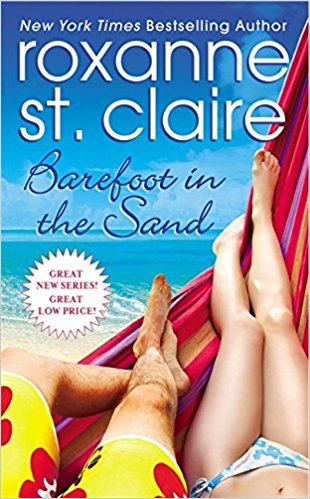 Barefoot in the Sand is presented as a fun beach read, but I thought there was more to it than that—it wasn’t a lightweight story. No, there was a lot else going on, which is how I like my romances.
Barefoot in the Sand is presented as a fun beach read, but I thought there was more to it than that—it wasn’t a lightweight story. No, there was a lot else going on, which is how I like my romances.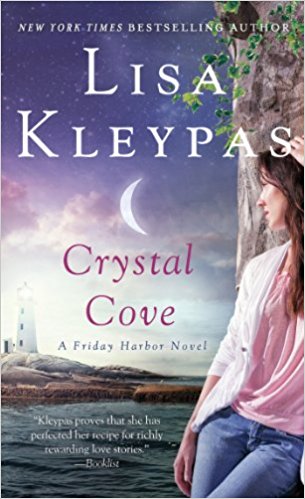 I really enjoyed the first three books in this series and was looking forward to this one, the fourth. There were elements of magic in all the other books, but they were very subtle and mostly unique. More magical realism than fantasy. This book embraces the magic of the series and runs with it and feels more urban fantasy than straight contemporary.
I really enjoyed the first three books in this series and was looking forward to this one, the fourth. There were elements of magic in all the other books, but they were very subtle and mostly unique. More magical realism than fantasy. This book embraces the magic of the series and runs with it and feels more urban fantasy than straight contemporary.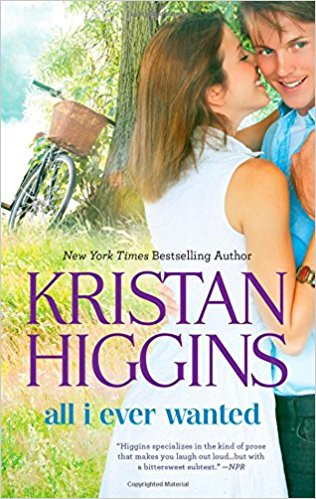 I’ve been reading Higgins for reasons I previously explained, and I’m still feeling an ambivalence about her books. This book, too, is funny, and there were some great scenes in. But here, as well, was a silly heroine. Now, she wasn’t silly 100% of the time, fortunately. No, she was both very good at her job as a marketing specialist and with children.
I’ve been reading Higgins for reasons I previously explained, and I’m still feeling an ambivalence about her books. This book, too, is funny, and there were some great scenes in. But here, as well, was a silly heroine. Now, she wasn’t silly 100% of the time, fortunately. No, she was both very good at her job as a marketing specialist and with children.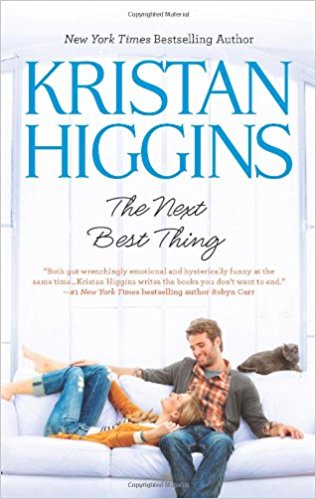 I’ve entered a bunch of romance contests. The way these things work is that judges read the beginning of the manuscript (usually between 15 and 30 pages of it) and give you as much feedback as they want. Sometimes you get a lot; sometimes a little. The feedback is always a bit all over the place. I had one entry where one judge said, “If the rest of the manuscript is as good as this, it’s publication-ready!” while another judge on the same entry gave me 60-something points out of 100 and said there was too much description and not enough internalization. So you have to take it with a grain of salt (and look for consistent criticism). They’re looking for things to comment on, after all, not just reading for pleasure.
I’ve entered a bunch of romance contests. The way these things work is that judges read the beginning of the manuscript (usually between 15 and 30 pages of it) and give you as much feedback as they want. Sometimes you get a lot; sometimes a little. The feedback is always a bit all over the place. I had one entry where one judge said, “If the rest of the manuscript is as good as this, it’s publication-ready!” while another judge on the same entry gave me 60-something points out of 100 and said there was too much description and not enough internalization. So you have to take it with a grain of salt (and look for consistent criticism). They’re looking for things to comment on, after all, not just reading for pleasure.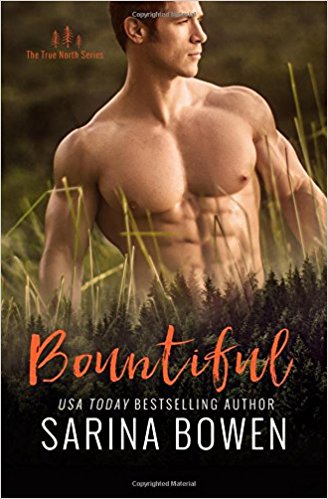 I’m a total Bowen fangirl, I know. Bountiful is the fourth book in the True North series, which continues to deliver. I’m already looking forward to the next one, even though I’m not sure who it will be about (though I have my suspicions).
I’m a total Bowen fangirl, I know. Bountiful is the fourth book in the True North series, which continues to deliver. I’m already looking forward to the next one, even though I’m not sure who it will be about (though I have my suspicions).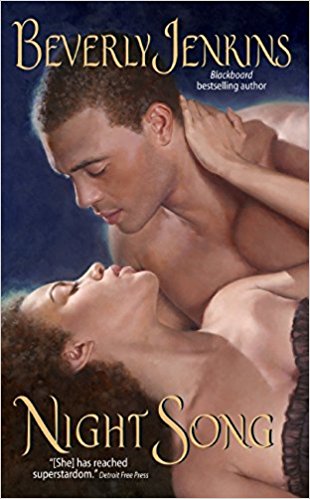 This is Jenkins’ first novel, the one that the publishing world didn’t know what to do with and amazed everyone. A story about post-Civil War black people? What? Who’d want to read that.
This is Jenkins’ first novel, the one that the publishing world didn’t know what to do with and amazed everyone. A story about post-Civil War black people? What? Who’d want to read that.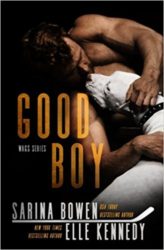 Good Boy is the first in a spin-off series from the Him and Us books by the two authors (about Jamie and Wes), which I previously reviewed. Two of the side characters in Us, Blake (Wes’s teammate) and Jess (Jamie’s sister) reappear in this book as hero and heroine. Blake was probably the most significant secondary character in Us and I have to admit I found him a wee bit annoying. He’s a bit on the effervescent side and is always making up words that make little sense and just being silly in general. It probably says something about me that that annoys me, but whatever.
Good Boy is the first in a spin-off series from the Him and Us books by the two authors (about Jamie and Wes), which I previously reviewed. Two of the side characters in Us, Blake (Wes’s teammate) and Jess (Jamie’s sister) reappear in this book as hero and heroine. Blake was probably the most significant secondary character in Us and I have to admit I found him a wee bit annoying. He’s a bit on the effervescent side and is always making up words that make little sense and just being silly in general. It probably says something about me that that annoys me, but whatever.